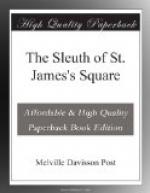The Count stopped a moment and lighted another cigarette.
“Pardon me if I seem to proceed obliquely. The incident is related to the case I approach; and it makes clear, monsieur, why the courts of France, for example, permit every variety of explanation in a criminal trial, while your country and the great English nation limit explanations.
“You do not permit hearsay evidence to save a man’s life; with a fine distinction you permit it to save only his character!”
“The rule,” replied the American justice, “everywhere among English-speaking people is that the best evidence of which the subject is capable shall be produced. We permit a witness to testify only to what he actually knows. That is the rule. It is true there are exceptions to it. In some instances he may testify as to what he has heard.”
“Ah, yes,” replied the Count; “you will not permit such evidence to take away a man’s horse, but you will permit it to take away a woman’s reputation! I shall never be able to understand these delicate refinements of the English law!”
“But, Count,” suggested Sir Henry Marquis, “reputation is precisely that what the neighborhood says about one.”
“Pardon, monsieur,” returned the Count. “I do not criticize your customs. They are doubtless excellent in every variety of way. I deplore only my inability to comprehend them. For example, monsieur, why should you hold a citizen responsible in all other cases only for what he does, but in the case of his own character turn about and try him for what people say he does?
“Thus, monsieur, as I understand it, the men of an English village could not take away my pig by merely proving that everybody said it was stolen; but they could brand me as a liar by merely proving what the villagers said! It seems incredible that men should put such value on a pig.”
Sir Henry Marquis laughed.
“It is not entirely a question of values, Count.”
“I beg you to pardon me, monsieur,” the Italian went on. “Doubtless, on this subject I do nothing more than reveal an intelligence lamentably inefficient; but I had the idea that English people were accustomed to regard property of greater importance than life.”
“I have never heard,” replied the Englishman, smiling, “that our courts gave more attention to pigs than to murder.”
“Why, yes, monsieur,” said the Count — “that is precisely what they have been accustomed to do. It is only, I believe, within recent years that one convicted of murder in England could take an appeal to a higher court; though a controversy over pigs — or, at any rate, the pasture on which they gathered acorns — could always be carried up.”
The great age of the Count — he seemed to be the representative in the world of some vanished empire — gave his irony a certain indirection. Everybody laughed. And he added: “Even your word `murder,’ I believe, was originally the name of a fine imposed by the Danes on a village unless it could be proved that the person found dead was an Englishman!




